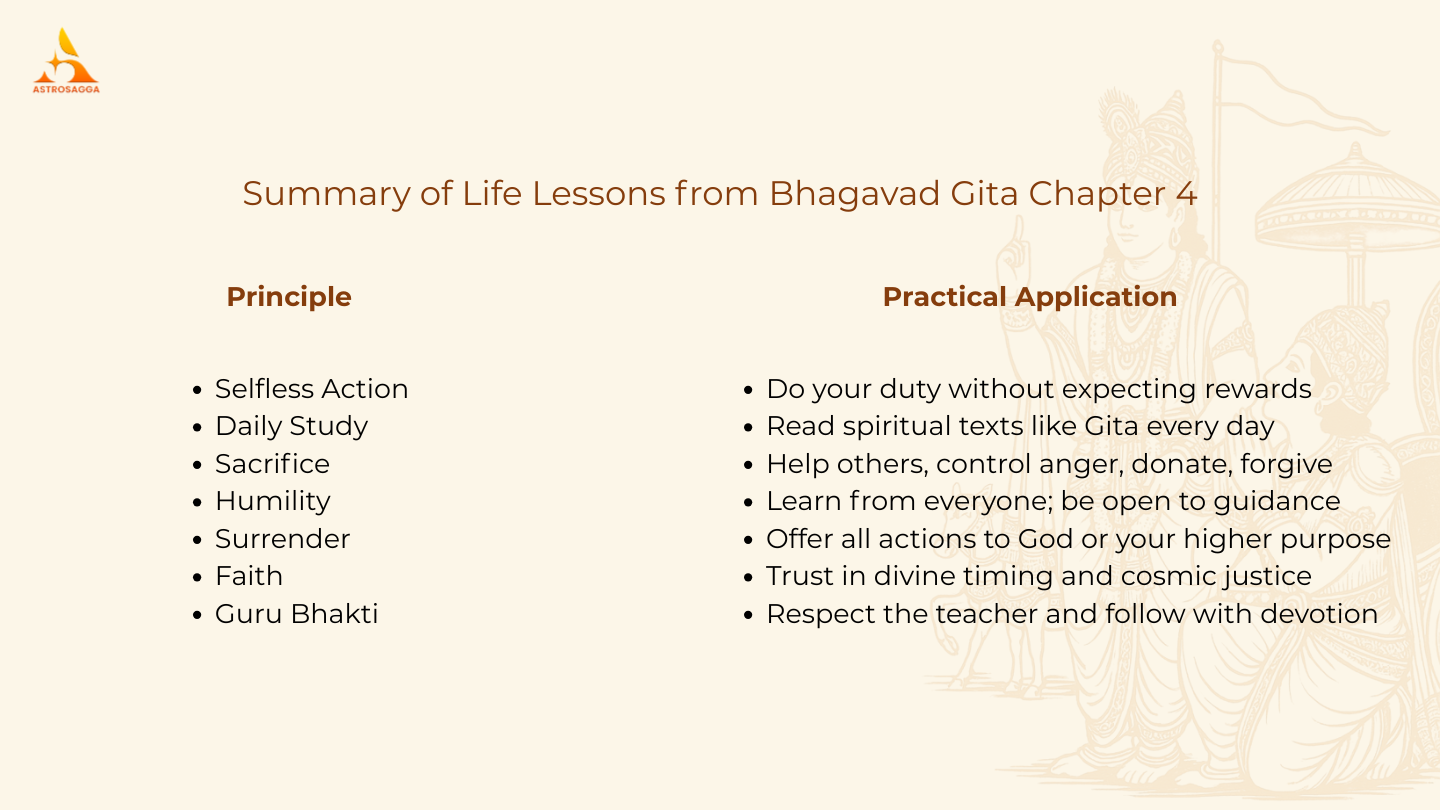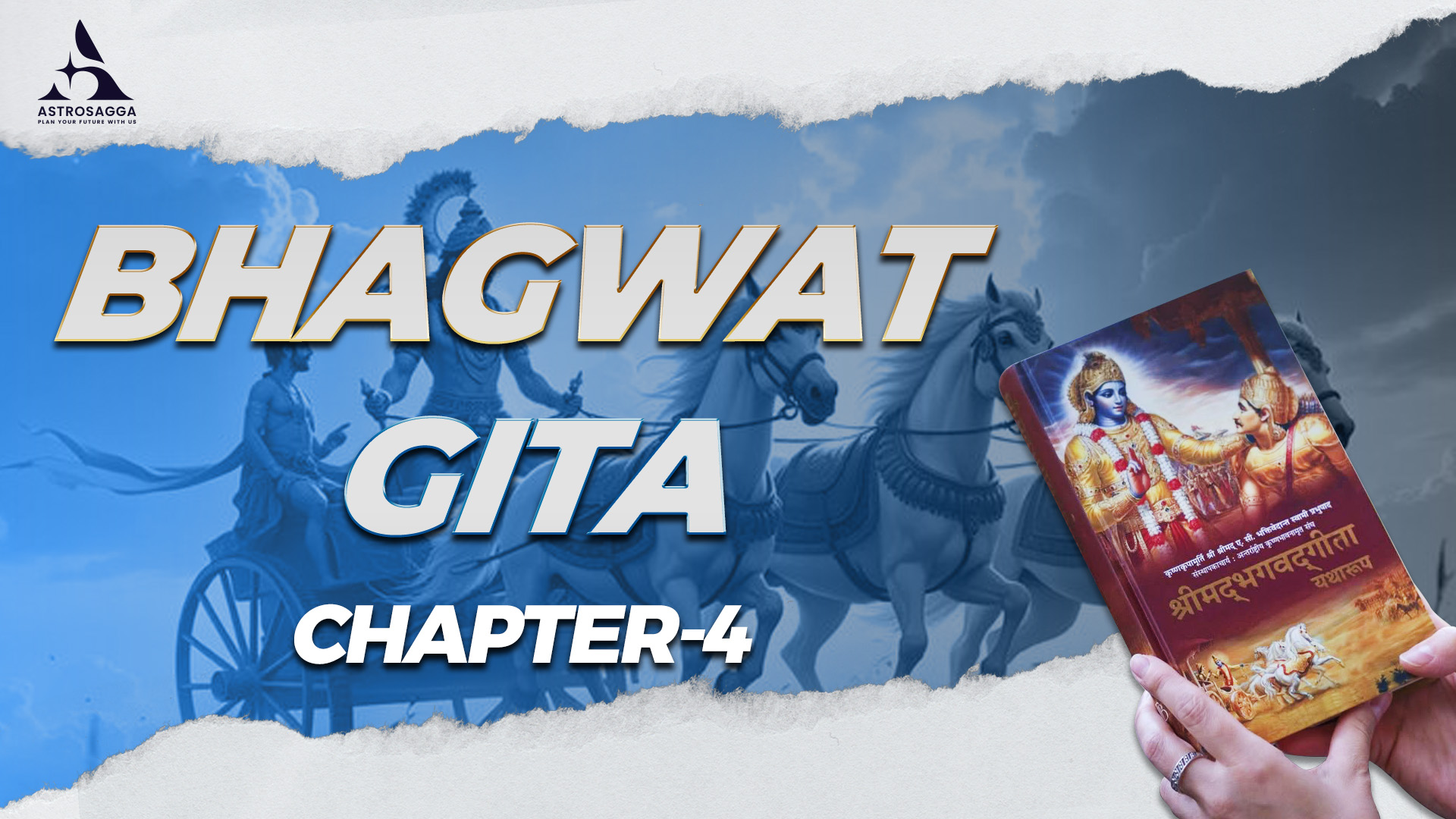Chapter 4 of the Bhagavad Gita is a powerful dialogue between Lord Krishna and Arjuna that focuses on how knowledge and selfless action (karma) can lead to liberation. Named Jnana Karma Sanyasa Yoga, this chapter explains that even inaction is a form of action when performed with spiritual awareness. It blends spiritual wisdom, karma yoga, and the importance of surrendering to divine guidance.
Lord Krishna also reveals divine secrets about His avatar (incarnation), the role of sacrifice (yajna), and how knowledge (jnana) is superior to ritualistic practices.
Key Teachings and Sanskrit Shlokas of Chapter 4
1. Eternal Nature of Spiritual Knowledge
Lord Krishna reveals that He taught this spiritual wisdom to the Sun God (Vivasvan) long ago, and it was passed through generations.
Sanskrit Shloka (4.1):
इमं विवस्वते योगं प्रोक्तवानहमव्ययम्।
विवस्वान् मनवे प्राह मनुरिक्ष्वाकवेऽब्रवीत्॥
Meaning: I taught this eternal yoga to the Sun-god, who passed it to Manu, who then taught it to King Ikshvaku.
Practical Tip:
Treat spiritual knowledge as precious. Make a habit of reading or listening to at least one verse daily from the Gita.
Read Also - Bhagavad Gita Chapter 3: Practical Tips for Life
2. Krishna’s Divine Avatar (Incarnation)
Krishna explains the reason for His divine appearance whenever dharma (righteousness) is in danger.
Sanskrit Shlokas (4.7-8):
यदा यदा हि धर्मस्य ग्लानिर्भवति भारत।
अभ्युत्थानमधर्मस्य तदाऽअत्मानं सृजाम्यहम्॥
परित्राणाय साधूनां विनाशाय च दुष्कृताम्।
धर्मसंस्थापनार्थाय सम्भवामि युगे युगे॥
Meaning: Whenever dharma declines and adharma rises, I manifest to protect the righteous and destroy the wicked.
Practical Tip:
Have faith that God appears whenever we need guidance. Align yourself with truth, and divine help will follow.
3. God is Eternal, His Birth is Divine
Krishna clarifies that though He appears to take birth, He is unborn, eternal, and not bound by karma.
Sanskrit Shloka (4.6):
अजोऽपि सन्नव्ययात्मा भूतानामीश्वरोऽपि सन्।
प्रकृतिं स्वामधिष्ठाय सम्भवाम्यात्ममायया॥
Meaning: Though I am unborn and eternal, I appear by My own divine power to guide the world.
Practical Tip:
You are also an eternal soul. Your true identity is not your job or body, but the soul inside.
4. Wisdom Purifies Actions
When actions are done with selfless intention and spiritual understanding, they don’t bind us.
Sanskrit Shloka (4.18):
कर्मण्यकर्म यः पश्येदकर्मणि च कर्म यः।
स बुद्धिमान्मनुष्येषु स युक्तः कृत्स्नकर्मकृत्॥
Meaning: He who sees inaction in action and action in inaction is wise and spiritually intelligent.
Practical Tip:
Do your daily work sincerely, but don’t crave the results. This detachment leads to inner peace.
5. Sacrifice (Yajna) – Beyond Fire Rituals
Krishna describes various types of yajna, such as knowledge, sense control, austerity, and charity.
Sanskrit Shloka (4.28):
द्रव्ययज्ञास्तपोयज्ञा योगयज्ञास्तथापरे।
स्वाध्यायज्ञानयज्ञाश्च यतयः संशितव्रताः॥
Meaning: Some perform sacrifice with wealth, some with austerity, others through self-study and knowledge.
Practical Tip:
You don’t need a temple or fire to do yajna. Even controlling anger, helping someone, or donating food is a sacrifice.
6. Knowledge is the Supreme Sacrifice
Sanskrit Shloka (4.33):
श्रेयान्द्रव्यमयाद्यज्ञाज्ज्ञानयज्ञः परन्तप।
सर्वं कर्माखिलं पार्थ ज्ञाने परिसमाप्यते॥
Meaning: Knowledge sacrifice is superior to material sacrifice, because all actions culminate in wisdom.
Practical Tip:
Invest in learning spiritual truths. Knowledge transforms you from inside and brings long-term peace.
7. Role of the Guru (Spiritual Master)
One of the most important teachings—approach a Guru with humility and desire to learn.
Sanskrit Shloka (4.34):
तद्विद्धि प्रणिपातेन परिप्रश्नेन सेवया।
उपदेक्ष्यन्ति ते ज्ञानं ज्ञानिनस्तत्त्वदर्शिनः॥
Meaning: Learn from a self-realized guru through humility, questioning, and service.
Practical Tip:
Be humble. A teacher, spiritual book, or even life’s experiences can be your guide if you stay open.
8. Knowledge Destroys Sin
Even the worst karmas can be dissolved through true understanding and spiritual awakening.
Sanskrit Shloka (4.36):
अपि चेदसि पापेभ्यः सर्वेभ्यः पापकृत्तमः।
सर्वं ज्ञानप्लवेनैव वृजिनं सन्तरिष्यसि॥
Meaning: Even the worst sinner can cross the ocean of sin through the boat of spiritual knowledge.
Practical Tip:
Don’t live in guilt. Use the Gita’s teachings to purify your past and walk a better path forward.
9. Faith is Essential for Transformation
Without faith, doubt destroys progress. Faith and clarity go hand in hand.
Sanskrit Shloka (4.40):
अज्ञश्चाश्रद्दधानश्च संशयात्मा विनश्यति।
नायं लोकोऽस्ति न परो न सुखं संशयात्मनः॥
Meaning: The ignorant and doubtful are lost. They find neither this world nor peace.
Practical Tip:
Have faith in the process of spiritual growth. Trust your path, even when progress feels slow.

How to Apply Chapter 4 in Daily Life
Start the day with a Gita verse and reflection
Convert daily chores into acts of devotion (karma yoga)
Learn something spiritually uplifting every week
Practice forgiveness and charity as yajna
Mentally dedicate all work as an offering to God
Find a teacher, mentor, or guide to walk with
Replace guilt and doubt with self-reflection and learning
Conclusion
Bhagavad Gita Chapter 4 teaches us that life becomes meaningful when lived with knowledge, devotion, and selfless action. You don’t need to renounce the world—just renounce ego and desire. Serve, learn, and surrender. That is the real path to peace and liberation.
Talk to astrologer or spiritual guide today to understand how the teachings of Gita Chapter 4 can align with your life's karma and dharma.














